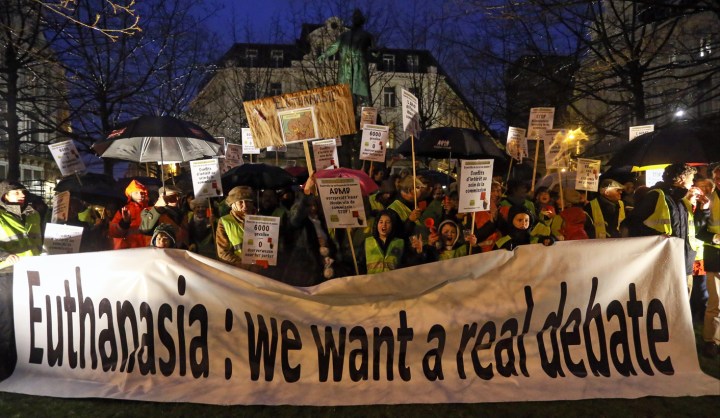Maverick Life
Mental illness and euthanasia: a conundrum within an ethical dilemma

On 15 September, convicted rapist and murderer Frank Van Den Bleeken was granted his request to be allowed to end his life, in accordance with Belgium’s 2002 Act on Euthanasia. It was a landmark decision. Not only is Van Den Bleeken a detainee – and thus part of a population group considered particularly vulnerable to rights abuses outside of the public eye – but his case was also made solely on the basis of mental suffering. By ANDREA TEAGLE.
leiAfter 30 years in prison, Van Den Bleeken still experiences violent sexual urges (linked to his crimes of rape and murder), which he claims cause him enough psychological anguish for him to want to end his own existence. Belgium is one of only three countries (the others being The Netherlands and Luxembourg) where euthanasia is legal, and the only one whose law explicitly provides for mental suffering as a justification for end of life decisions.
“Terminal illness is usually a condition for euthanasia,” explains Professor Willem Landman, CEO of the Ethics Institute of South Africa. “However, a second, juxtaposed category that I would support is unbearable suffering induced by pain or distress.”
Landman’s sentiments are echoed in the 2002 Belgium Euthanasia Act: provided that the request is deliberate, well considered and repeated, euthanasia may be performed in cases of “constant and unbearable physical or mental suffering that can not be alleviated, resulting from a serious and incurable disorder caused by illness or accident”.
Despite this provision, euthanasia motivated solely on the basis of mental anguish remains relatively uncommon and highly controversial. With the exception of cases of severe and irreversible cognitive decline (such as that caused by Alzheimer’s), mental health is often absent from the euthanasia debate, which has traditionally centered on terminally and physically ill patients beset by pain. While Van Den Bleeken himself remains incarcerated, his story has traversed the globe, leaving in its wake freshly stirred debate around mental illness and euthanasia.
Underpinning much of the contention is an application of the slippery slope argument, which is also the primary reason that euthanasia remains illegal in many otherwise progressive countries. This is an objection not to euthanasia itself, but rather to the unintended consequences of granting the power to end a life. The argument is that the bounds of regulations will be gradually overstepped, until euthanasia becomes a smokescreen for unjustified killings: cases where not all treatment options are explored, the patient’s judgment is in some way impaired, or the request made under duress.
Some advocates of end of life decisions, such as the non-profit organization DignitySA, maintain that it should be restricted to patients who are terminally ill, and who are able to perform the final action to end their own lives, so as to guard against abuse.
Where a patient’s choices are already restricted, this concern is especially pertinent. Critics of the recent ruling in favour of Van Den Bleeken’s case point out that it comes against a backdrop of historically inadequate mental health support in Belgian prisons. Last year in January, for example, the European Court of Human Rights found care of prisoners with mental illness was ‘inadequate’ due to structural deficiencies. This seriously calls into question whether enough is being done to ensure euthanasia requests by prisoners are made as a last resort, and that the right to healthcare in prisons is fully realised.
This once again brings us back to the importance of assessing requests on a case-by-case basis. Belgian law requires that three psychiatrists independently judge that all treatment alternatives have been explored and that the patient’s condition is incurable before a request is granted.
There are other ethical difficulties that are particular to prisoners. For example, to what extent might psychological illness and mental suffering have their roots in a hostile environment and the absence of freedom? Would the person still request dying if he were outside the prison? If no, should the request be granted? Does intolerable mental suffering go beyond the punishment that incarceration is intended to impose (assuming a retributive rather than restorative theory of justice)?
“I would be very hesitant in the case of a prisoner,” says Landman, “I cannot say that there would never be a case where conditions are satisfied to grant the request… but anything involving prisoners should be approached with great caution.”
Yet, even if Van Den Bleeken were not a detainee, his case would still have been a controversial one, motivated as it was by mental suffering. Part of the controversy around mental suffering as a basis for euthanasia is warranted. The underlying causes of mental illnesses are complex and prognosis is often uncertain. It is rare that a psychiatrist can say with absolute certainty that all treatment is futile and that suffering cannot be alleviated.
Then there is the role of mental illnesses or other mood disorders to consider. Mood disorders can form part of the basis for a request; however, this should be differentiated from a case in which a patient’s judgment is clouded by a temporary low – or where, to put it differently, the request is a symptom of a treatable illness.
However, Landman cautions, “Depression is not the same as incompetence. That is very important. To make a general statement that depression rules out competence is nonsense.”
Earlier this year, another case in Belgium made headlines when Nathan Verhelst was granted the right to end his life after a botched sex change operation left him feeling ‘like a monster’. Verhelst suffered from post-traumatic stress disorder as a result of having been raped by his brothers during childhood. Opponents of the ruling worried that the patient might have overcome his suffering and changed his mind later on, had he continued psychological treatment.
The flipside to this objection is that Verhelst’s decision was supported by medical professionals and withstood Judicial interrogation. In countries where euthanasia is illegal, many in Verhelst’s position of mental suffering turn instead to suicide or assisted suicide. The regulations that underpin euthanasia are intended to act as a safeguard against unnecessary death as well as to recognise a person’s life right to end her life in a dignified manner under particular circumstances. Due process might, in some cases, alert patients to treatment possibilities that might otherwise have been missed.
“Wherever there is an act, there will be people who contravene the act in the legislation,” Landman argues, “but claims of abuse are wildly exaggerated. It can be controlled – look at [the state of] Oregon, for example.”
While it is undoubtedly more difficult to make a prognosis in complex psychological cases, that does not mean that such cases do not merit consideration. And, while part of the controversy around Van Den Bleeken’s case is due to practical concerns detailed above, part of it reflects misunderstanding of mental illness, and a refusal to consider such illnesses on a par with physical diseases.
Conditions like Van Den Bleeken’s may not invite easy empathy, but they are nonetheless very real, and the fact that they are often not recognised, and treated, as legitimate illnesses is problematic. It would seem ridiculous today to suggest that a physical illness like cancer is a reflection of weakness or some other character flaw; yet mental illness still carries stigma, rooted in the idea that sufferers should be able to deal with their ‘issues’, or that they are in some way responsible for their illness.
The ongoing challenge that Belgium faces is that of ensuring that euthanasia always reflects the true will of the patient. In South Africa, renowned for having one of the most (if not the most) progressive constitutions in the world, euthanasia remains illegal. The debate was rekindled here just a few months ago when Desmond Tutu spoke up in favour of end of life decisions in reference to Madiba, who, he said, was ‘not himself’ during the last months of his life and was whose final vegetative days were distinctly incongruent with the dignified manner in which he lived his life.
Ironically, it was Mandela who pioneered the End of Life Decisions Act- drafted by the South African Law Commission, in 2000. Although it hasn’t been rejected outright by parliament, the act has remained in legal purgatory – eliciting zero debate in Parliament, and not being opened to the public for comment. The next challenge to current SA legislature will likely be lead by the non-profit DignitySA (DSA), which champions the legalization of assisted dying, but not euthanasia. DSA’s proposed law change would allow for end of life decisions in the select case where a terminally ill, dying patient requests the means to end her own life. In such a case, providing the means would be allowed, provided the patient, and not the physician, takes the final step.
“People with mental illness would not qualify for an assisted death under our Bill,” says Lee Last, executive member of DSA. “We, as an organization and as a society, have a duty to protect the vulnerable, which includes those living with mental illness.”
At present, even the tightly regulated option of assisted dying is illegal in South Africa. Those who wish to terminate their lives are left with few choices, none of which are easy and require a myriad legal tiptoeing and maneuvering thanks to a lack of clear legislative guidance. And as previously reported by Daily Maverick, confusion reigns between the medical profession and our current legal framework.
“The issue is one that our constitution should decide,” argues Professor Landman. “We’re never going to arrive at any ethical agreement. The question is what consensus can we reach as citizens, not individuals. By the principals of the constitution, we have to accept some choices that people make that aren’t harming others, even if we do not agree.
“This [the right to die] has not been tested by our Constitution. But to allow a person to suffer immeasurably is unconstitutional,” he adds.
People do not evolve into increasingly moral beings from generation to generation. However, institutions can become more just over time because they are the result of collective learning, and can embody principals in a way that is consistent and free of individual biases.
So while Van Den Bleeken solemnly celebrates the right to end his life, and other mental health patients approach the courts with similar applications, we should use the guiding principals of our constitution to take stock of this conundrum within an ethical dilemma. And while governments and lobby groups debate the broader issues the world over, we shouldn’t forget that support for people with mental illnesses should begin at the most basic level of healthcare and extend – within a protective regulatory framework – all the way to end of life decisions. DM
Photo: Activists of the collective Yellow Safety Jacket protest against the proposed statutory amendment legalizing the euthanasia of young children, in Brussels, Belgium, 11 February 2014. The Belgian Senate passed a bill extending the euthanasia law to terminally-ill children. Belgium Chamber votes on the disputed amendment on 13 February. EPA/JULIEN WARNAND















 Become an Insider
Become an Insider